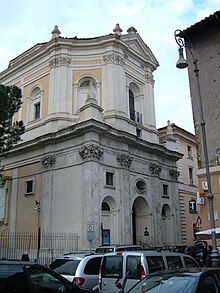Chiesa di Santa Rita da Cascia in Campitelli
| Santa Rita da Cascia in Campitelli | |
|---|---|
 |
|
| Basic information | |
| Location |
|
| Geographic coordinates | 41°53′33″N 12°28′48″E / 41.89250°N 12.48000°ECoordinates: 41°53′33″N 12°28′48″E / 41.89250°N 12.48000°E |
| Affiliation | Roman Catholic |
| Year consecrated | 1643 |
| Ecclesiastical or organizational status | Church |
| Architectural description | |
| Architect(s) | Carlo Fontana |
| Architectural style | Baroque |
The Chiesa di Santa Rita da Cascia in Campitelli is a deconsecrated church in Rome (Italy), in the rione Sant'Angelo; it is located in Via Montanara, at the crossroad with Via del Teatro Marcello. The church formerly rose on the preexisting Chiesa di San Biagio de Mercato, whose remains were discovered during the dismantling of Santa Rita.
The church was built in 1643 by architect Carlo Fontana in place of a former church, built by the family Bucabella in the 11th century, and rose at the base of the staircase of Santa Maria in Aracoeli, on its left side. It was dedicated to Saint Blaise. Pope Alexander VII entrusted the church to the brotherhood of the Holy Thorn of the Cross of Jesus.
The dedication to Saint Rita of Cascia was added to the one to Saint Blaise in 1900, the year of her canonization.
In 1928, as a consequence of the demolitions in the area to make space to the Via del Mare (now Via del Teatro di Marcello), the church was dismantled piece by piece and deposited with the aim of rebuilding it in the same place. Nonetheless, in 1940 the church was rebuilt in its present location, as remembered by a commemorative stone on the left side of the building.
Questa chiesa già esistente alle falde del Campidoglio presso la scala di S. Maria in Aracoeli demolita nell'anno 1928, VI dell'era fascista, fu qui ricostruita a cura del Governatorato di Roma. 21 aprile 1940.
(This church, already existing at the slopes of the Capitoline Hill close to the staircase of S. Maria in Aracoeli, demolished in the year 1928, VI of the fascist era, was rebuilt here by Rome Governorate. April aprile 1940.)
The church is now deconsecrated and used for meetings, conferences and concerts.
The façade is decorated with lesenes and stuccoes. The interior is on the Greek cross plan with a convex rhomboidal map, like the one of San Carlo alle Quattro Fontane. The apse, deeper than the side chapels, still houses the baroque altar made of polychrome marbles and a stained glass window depicting Saint Rita of Cascia. The dome is in the middle.
...
Wikipedia
